The clinical trial failed to show that experimental Alzheimer’s drug crenezumab could prevent cognitive decline. Why the drug failed remains unclear.
There were more than 140 experimental Alzheimer’s drugs in clinical trials as of the start of 2022. On the one hand, this number inspires some optimism that something will break through. But at the same time, each of these drugs faces more than a 99-percent chance of failure. This month, another potential disease-modifying Alzheimer’s drug, which has been in trials for nearly a decade, is dropping out of the race.
Genentech, a biotech company under Roche, announced that their anti-amyloid drug crenezumab, developed in conjunction with Switzerland-based biotech company AC Immune SA, has ultimately failed to slow or prevent Alzheimer’s disease in a cohort of cognitively healthy people with early-onset Alzheimer’s genes.
“We’re disappointed that the treatment did not demonstrate a statistically significant clinical benefit,” Dr. Eric M. Reiman, Banner Alzheimer’s Institute executive director and one of the study leaders, said in a news release. “At the same time, we’re proud of the impact that this precedent-setting trial has had in shaping a new era in Alzheimer’s prevention research and we’re extremely grateful to our research participants and their families.”
In the Phase 2 clinical trial, 252 people were randomized to receive crenezumab or placebo over the course of five to eight years. But the drug failed to prevent the decline in cognitive function or episodic memory which occurs as a result of early-onset Alzheimer’s.
The participants in the clinical trial had autosomal dominant Alzheimer’s disease which is caused by mutations in the APP, PSEN1 or PSEN2 genes. Even carrying one copy of these genes leads to greater build up of amyloid plaques and symptoms developing in people between their 30s and 60s.
Expert reactions to the data
While this attempt at targeting beta-amyloid plaques failed to improve cognitive outcomes, it is unclear whether the drug effectively reduced plaque build-up, highlighting just how little the research community knows for certain about how Alzheimer’s forms and progresses.
David Knopman, a professor at the Mayo Clinic College of Medicine wrote that crenezumab previously failed Phase 3 clinical trials for non-genetic forms of Alzheimer’s disease, even though the drug was administered at a higher dose than in this recent study.
Knopman added, “The crenezumab trial in the Colombian dominantly inherited [Alzheimer’s] cohort is disappointing, but not altogether unpredicted based on earlier failures of crenezumab in sporadic Alzheimer’s, and based on the inability of crenezumab to clear brain amyloid to any extent.”
Marc Aurel Busche and Samuel Harris, both physician-scientists at University College London, emphasized that we know very little about the role of amyloid proteins and beta-amyloid plaques in the healthy brain. In one study authored by Busche, anti-amyloid antibodies actually worsened Alzheimer’s pathology in mice.
“We conclude that our understanding of the effect of anti-amyloid antibodies on brain (dys)function in humans with [Alzheimer’s] is rudimentary,” they wrote, adding that therapeutic benefits could be masked by detrimental effects of anti-amyloid antibodies.
The first-ever FDA-approved disease-modifying drug for Alzheimer’s, Aduhelm (aducanumab) was designed with similar mechanisms. Another monoclonal antibody, Aduhelm targets beta-amyloid, too. But, since its FDA approval, the drug has been mired in controversy over unclear efficacy data. While some researchers and drug developers are exploring other avenues to addressing Alzheimer’s altogether — from the microbiome to tau protein tangles — the research community hasn’t given up on beta-amyloid as a target, nor on these “-mab” drugs as an approach.
Next in the Roche pipeline: gantenerumab
In the meantime, Roche is focused on advancing its other anti-amyloid drug, gantenerumab. This anti-amyloid received a Breakthrough Therapy designation from the Food and Drug Administration in October 2021.
Gantenerumab failed Phase 3 clinical trial in 2014 but was brought back as an Alzheimer’s drug candidate in 2017, to test whether it may provide preventative benefits. The ongoing Phase 3 trial is exploring whether the drug can prevent cognitive decline in healthy individuals aged 60 to 80 who have evidence of Alzheimer’s biomarker beta-amyloid build-up in the brain.
Unlike other anti-amyloid drugs, i.e. Aduhelm, gantenerumab is not administered intravenously. Instead, it would be delivered via subcutaneous injection — where the drug is administered under the skin — potentially enabling at-home treatment. Results from a Phase 3 clinical trial assessing its efficacy in early Alzheimer’s is expected by the end of the year.



